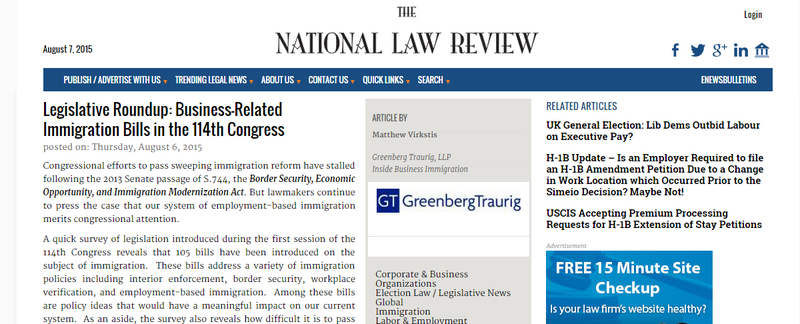Legislative Roundup: Business-Related Immigration Bills in the 114th Congress
Congressional efforts to pass sweeping immigration reform have stalled following the 2013 Senate passage of S.744, the Border Security, Economic Opportunity, and Immigration Modernization Act. But lawmakers continue to press the case that our system of employment-based immigration merits congressional attention.
A quick survey of legislation introduced during the first session of the 114th Congress reveals that 105 bills have been introduced on the subject of immigration. These bills address a variety of immigration policies including interior enforcement, border security, workplace verification, and employment-based immigration. Among these bills are policy ideas that would have a meaningful impact on our current system. As an aside, the survey also reveals how difficult it is to pass immigration legislation in the current legislative environment: only two bills, H.R.3009 (dealing with “sanctuary cities”) and S.1300 (dealing with international adoption) have been approved by a single chamber during the first seven months of the session. And only a handful has even had the benefit of any committee consideration.
Of the 105 bills introduced, at least 12 concern employment-based immigration and workplace compliance. Notable bills include Senator Orrin Hatch’s I-Squared Act (S.153) (significant reforms to the H-1B visa program), Representative Jason Chaffetz’s bill, the Fairness for High-Skilled Immigrants Act (H.R.213) (elimination of per-country quotas for employment-based immigrants), and Senator Grassley’s Accountability through Electronic Verification Act (S.1032) (national mandatory E-Verify participation).
Other bills include H.R.1019/S.1547, the Partner with Korea Act (E-4 Treaty Trader visa for South Korea); H.R.1147, the Legal Workforce Act (E-Verify expansion); H.R.1834, the E-2 Visa Improvement Act (adjustment of status for certain long term E-2 nonimmigrants); H.R.2181, the STAPLE Act (relief from numerical limitations for STEM graduates); H.R.2681, the Training Highly Skilled Americans Act (STEM education fund for low income U.S. students); and H.R.2758 (permanent authorization of the H-2B “returning worker exemption”).
Congress’s efforts in the immigration policy arena over the last decade reflect just how difficult this issue has been for legislators. Despite broad bipartisan recognition that our immigration system is in need of serious and thoughtful attention from lawmakers, Congress has demonstrated three times now since 2006, under both Republican and Democratic administrations, that comprehensive reform has proven to be an insurmountable challenge. Going forward, if lawmakers of both parties are willing to reshape the political paradigm of the past decade and recalibrate expectations about what is possible in the immigration policy arena, progress may be made.
Glimmers of bipartisan cooperation on business-related immigration measures can be found in the 114th Congress. Senator Hatch’s I-Squared Act, mentioned above, has 13 bipartisan cosponsors, including independent Senator Angus King from Maine. Representatives Jared Polis and Mark Amodei introduced H.R.616, the American Entrepreneurship and Investment Act to reauthorize and improve the EB-5 Immigrant Investor Program, and have been joined by 21 bipartisan cosponsors. And just recently, Senate Judiciary Committee Chairman Charles Grassley and Ranking Member Patrick Leahy joined together and introduced S.1501, the American Job Creation and Investment Promotion Reform Act to do the same. The leadership and cooperation of these senators and representatives should inspire other lawmakers to look forward and seize opportunities to make progress where possible.
Mentions
States
- New York
Securities Disclaimer
This website is for informational purposes only and does not constitute an offer or solicitation to sell shares or securities. Any such offer or solicitation will be made only by means of an investment's confidential Offering Memorandum and in accordance with the terms of all applicable securities and other laws. This website does not constitute or form part of, and should not be construed as, any offer for sale or subscription of, or any invitation to offer to buy or subscribe for, any securities, nor should it or any part of it form the basis of, or be relied on in any connection with, any contract or commitment whatsoever. EB5Projects.com LLC and its affiliates expressly disclaim any and all responsibility for any direct or consequential loss or damage of any kind whatsoever arising directly or indirectly from: (i) reliance on any information contained in the website, (ii) any error, omission or inaccuracy in any such information or (iii) any action resulting therefrom.




